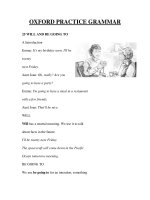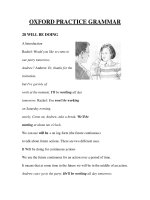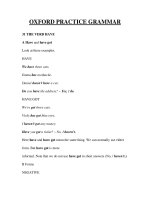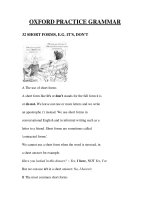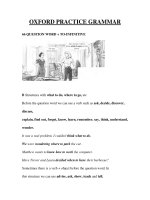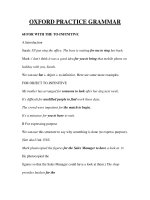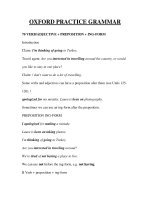Tài liệu OXFORD PRACTICE GRAMMAR 7 doc
Bạn đang xem bản rút gọn của tài liệu. Xem và tải ngay bản đầy đủ của tài liệu tại đây (87.76 KB, 7 trang )
OXFORD PRACTICE GRAMMAR
7 STATE VERBS AND ACTION VERBS
A States and actions
STATES
A state means something staying the same.
The flat is clean.
The farmer owns the land.
The box contained old books. State
verbs cannot usually be continuous. NOT
The farmer is owning the land.
ACTIONS
An action means something happening.
I'm cleaning the flat.
The farmer is buying the land.
He put the books in the box. Action verbs
can be simple or continuous.
He put I He was putting everything away.
Some state verbs: be, believe, belong, consist of, contain, depend on,
deserve, exist, hate, know, like, love,
matter, mean, own, need, prefer, remember, resemble, seem,
understand
B I think/I'm thinking etc
Sometimes we can use a verb either for a state or for an action.
STATES (simple tenses)
I think you're right. (= believe) We
have three cars. (= own) I come
from Sweden. (= live in)
I see your problem. (= understand)
Do you see that house? (= have in sight)
This picture looks nice.
She appears very nervous. (= seems)
The bag weighed five kilos.
The coat fits. (= is the right size)
ACTIONS (simple or continuous)
I'm thinking about the problem.
We're having lunch. (— eating)
I'm coming from Sweden. (= travelling)
/ usually come on the plane.
Mark is seeing his boss. {= meeting)
I see Daniel quite often.
I'm looking at this picture.
She appeared/was appearing in a film.
They weighed/were weighing my bag.
I'm fitting a lock to the window.
These examples with the verb be are about how people behave.
PERMANENT QUALITY TEMPORARY BEHAVIOUR
Claire is a very sociable person. Andrew is
being very sociable today.
You are being an idiot this morning.
(= You are behaving like an idiot.)
We use am/are/is being only to talk about behaviour, not about other things.
I'm
better now, thanks. Are you ready? Is anyone interested?
I like/I'm liking etc
We can use some state verbs in the continuous to talk about a short period of
time.
PERMANENT STATE (simple tenses)
/ love/enjoy parties.
I like school.
Holidays cost a lot of money.
SHORT PERIOD (continuous)
I'm loving/enjoying this party. I'm
liking school much better now. This
trip is costing me a lot of money.
Sometimes we can use either the simple or the continuous with no difference
in meaning.
You look well, OR You're looking well. We feel a bit sad. OR We're feeling
a bit sad.
That man is an idiot.
7 EXERCISES
1 States and actions (A)
Tom is on the Internet. He's telling people about himself.
Say which verbs express states and which express actions.
► I surf the Net most evenings, action
1 My flat is in the town centre................................
2 I drive a taxi in the daytime .................................
3 I own two cars. .........................
4 I go to lots of parties.
5 I love football. ..........................
2 I think/I'm thinking etc (B)
Complete the conversation. Choose the correct form of the verb.
Emma: Hi, Matthew. What (►) do you look/are you looking at?
Matthew: Oh, hi. These are photos of me when I was a child.
Emma: Oh, look at this one. (1) I think/I'm thinking you look lovely,
Matthew.
Matthew: (2) I have/I'm having some more photos here.
Emma: Look at this. Why such a big coat?
Matthew: It was my brother's. That's why (3) it didn't fit/it wasn't fitting
properly.
Emma: Oh, (4) I see/I'm seeing. And (5) you have/you're having your tea
here. And in this one
(6) you think/you're thinking about something very serious.
Matthew: This is a photo of the village (7) I come/I'm coming from.
Emma: Oh, that's nice.
Matthew: And I caught this fish, look. (8) It weighed/It was weighing about
half a kilo.
Emma: What a nice little boy! And what a sentimental old thing you are
now!
3 The verb be (B)

